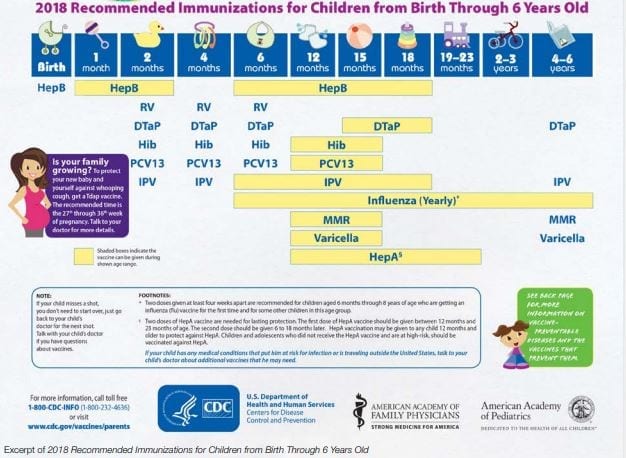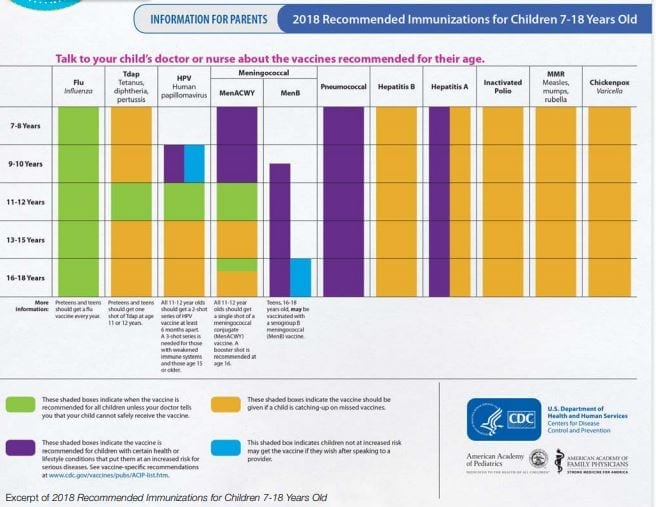For many, back-to-school means a new backpack, folders, books, and clothes. But it’s also a time to make sure your child has what he or she needs most to be
successful – good health. Immunizations have helped children stay healthy for more than 50 years. They are safe, and they work. As you prepare for the new school year, don’t forget that good health starts with immunization.
ACT TO PREVENT, RATHER THAN TREAT
No one wants to get sick. And one of the best ways to stay healthy is to make sure everyone is immunized on schedule.
Did you know immunizations are the safest and most cost-effective way of preventing disease, disability, and death? Costs from getting sick may include doctor visits, hospital stays, and lost time from work to care for sick children. It is always better to prevent a disease than to have to treat it or live with the consequences of having it.
Immunizing each child also helps to protect the health of our community, especially those people who cannot be immunized. This includes children who are too young to be vaccinated or who can’t receive certain vaccines for medical reasons. It also protects the small number of people who don’t respond to a certain vaccine.
The recommended schedule of immunizations has been researched and documented to be the most effective and safest way to protect children. The vaccines are carefully timed to provide protection when children are most vulnerable and when the vaccines will produce the strongest response from the child’s immune system. See this page and the next page for an at-a-glance look at the immunizations your children need.


BUILD AND BOOST THE IMMUNE SYSTEM
Immunity is the body’s way of preventing disease. The recommended immunization schedule is designed to work best with a child’s immune system at certain ages and at specific times. Researchers are always studying how well vaccines work. For many vaccines, multiple doses are needed to fully protect your child. The doses need to be spaced out a certain amount to work the best.
Each vaccine dose is scheduled by using two factors. First, it is planned for the age when the body’s immune system will work the best. Second, it is balanced with the need to provide protection to infants and children at the earliest possible age. Your child’s doctor knows that any length of time without immunizations is a time without protection. Any change to the schedule only increases the chance of infection. And, studies have shown that delaying immunizations also increases the likelihood that children won’t get fully vaccinated.
If Cost Is a Factor – If you are unable to pay for vaccines, you may be able to get help from the Vaccines for Children (VFC) program. VFC is federally funded program that has been providing vaccines to children in need since 1994. For more information, go to www.cdc.gov/vaccines/programs/vfc/index.html.
See Also: Child Vaccinations
CHECK WITH YOUR CHILD’S DOCTOR
The back-to-school season is a good time to put your child’s yearly well-child visit on your family’s schedule. If your child’s well-child visit is scheduled at another time of the year, make sure the health information your school has on file is current for the new school year. Also, make sure sports health forms are current if your child participates in sports.
Well-child visits are a good opportunity to talk with your child’s doctor about any other health concerns you may have. Your child’s doctor knows that you care about your child’s health and safety.
And don’t forget…immunizations are important for teens, too! If there’s a teen in your home, be sure to ask your doctor about the 3 routine vaccines given at the 11- or 12-year well-child visit. They include human papillomavirus (HPV), tetanus-diphtheria–acellular pertussis (Tdap), and meningococcal vaccines.
- HPV vaccine prevents infection against viruses associated with many cancers, including cervical cancer. (See page 10.)
- Tdap vaccine helps protect against diphtheria, tetanus (lockjaw), and pertussis (whooping cough).
- Meningococcal vaccine protects against very serious bacterial diseases that affect the blood, brain, and spinal cord.
Also, teens who did not receive all their routine immunizations when younger need catch-up vaccines.
REMEMBER
Timely vaccination is one of the most powerful ways to protect your child. It’s also the most beneficial and enduring way to help your child stay ahead of the
learning curve this school season. For more information on the health benefits of immunizations and starting school on the right foot, visit www.HealthyChildren.
org/Immunizations.

